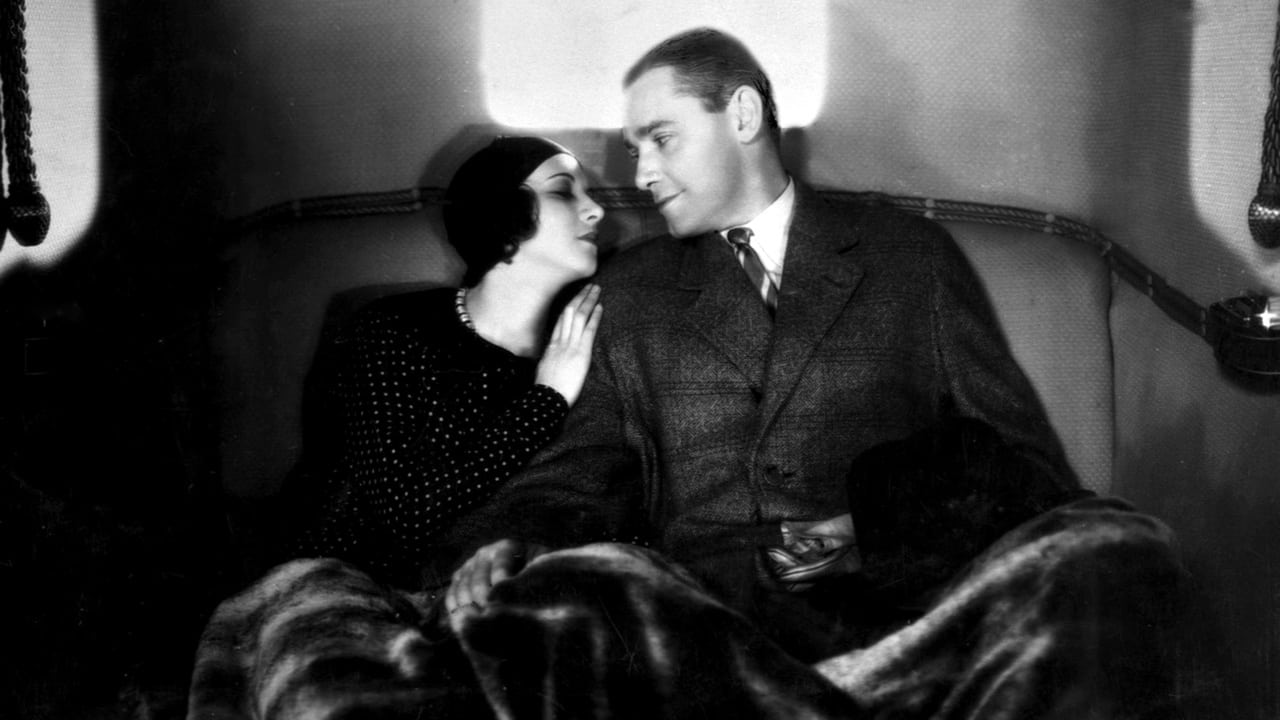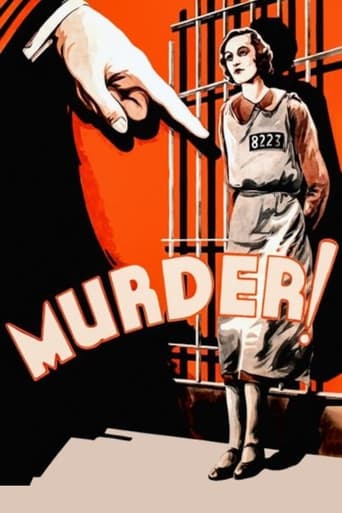



The Worst Film Ever
Boring, over-political, tech fuzed mess
Clever and entertaining enough to recommend even to members of the 1%
View MoreA clunky actioner with a handful of cool moments.
'Murder!' is much thrilling and better movie than its current (2018) score might imply, although bit meandering and uneven in pacing the story is still interesting and well though out. The opening scene where camera movies along the street and people open their windows to the noise is pure example of genius director at work. The courtroom scene and the one after that where the jury argues over the verdict is wonderfully suspenseful. With the jury scene Hitchcock also plays wonderful trick how people with different opinions and understandings are sometimes simply bullied to agree with the great majority without even listening their arguments. The middle part of the film where the main character tries to solve the murder, although offering some humorous moments might seem bit dull to some, but shortly before the great reveal, the film picks up the pace and thrills when the main character starts his cat and mouse game with the supposed killer. And then the thrilling ending.Definitely worthwhile early Hitchcock picture.
View MoreDirector: ALFRED HITCHCOCK. Screenplay: Alfred Hitchcock and Walter C. Mycroft. Adapted by Alma Reville from the stage play "Enter Sir John" by Clemence Dane and Helen Simpson. Photography: Jack Cox. Supervising film editor: Emile de Ruelle. Film editor" Rene Marrison. Art director: John Mead. Music director: John Reynders. Assistant director: Frank Mills. Sound recording: Cecil B. Thornton. RCA Sound System. Producer: John Maxwell. A British International Picture, made and recorded at Elstree Studios. Copyright 24 October 1930 by British International Pictures (America) Ltd. Released in the USA by British International, in the U.K. by Wardour Film Distributors. New York opening at the George M. Cohan: 24 October 1930. U.K. release: August 1930. 10 reels. 92 minutes. SYNOPSIS: Disappointed with the jury's verdict, a famous actor sets out to prove that a young thespian has been wrongfully convicted of murder. NOTES: Excluding the sketches he contributed to Elstree Calling (1930), this is Alfred Hitchcock's third sound film (following Blackmail and Juno and the Paycock). COMMENT: Hitchcock does his best to liven up what is basically a filmed stage play with a stunningly cinematic climax in a real-life circus. There is a bit of probing with fast cutting and a spinning camera and a lot of experimentation with sound (which, of course, was still very much a novelty in 1930). Herbert Marshall plays the hero in much his usual style (which is suitably in character here) while Norah Baring makes a rather colorless heroine (which is also appropriate). Both are outshone by the support cast: Phyllis Konstam as a delightfully third-rate repertory actress who is appealingly partnered by Edward Chapman in an unusual role as a secondary lead; Esme Percy as a performer of all work; Miles Mander as a suspicious inebriate; and Una O'Connor up to her usual vocal tricks of constant whining and criticism in what is fortunately just the one scene.
View More"Murder" from 1930 is a rare film from Alfred Hitchcock in that the plot is a "whodunit." I can't recall many other films where the director would use the same kind of narrative. It works quite well on the whole but the pace could have been better and a running time of 90 minutes or less would have helped also. The explanation given at the end of the film for the murder, is rather unexpected and quite daring for those more Conservative times. It changes the complexion of the whole story. The killing of a theatre actress at the beginning, leads to the arrest and trial of a woman who's a member of the same acting company. Whilst the jury members debate who whether the woman is guilty or not, Herbert Marshall as one of the jurors, initiates his own investigation. With the assistance of Edward Chapman (later in some of the Norman Wisdom comedies), they both uncover a good deal of information that casts some doubt as to the suspect's guilt. There are many great Hitchcock moments and it's always interesting to follow Herbert Marshall's efforts in obtaining the truth. There is an interesting scene during when Marshall is having a shave. As he gazes into his mirror in a somewhat melancholic state of mind, his thoughts about the case are reflected in a separate voice-over which was recorded by the actor. An effective scene. In spite of the over-length, "Murder" is still a pretty darn good film.
View MoreThe print used by studio canal in their box set with a death mask of Hitchcock - has dropouts in which the screen goes BLACK. I mean come on its 2017. ...................political correctness ..... no killer can be gay...or has black blood.......... or whatever?.......... its an old movie LEAVE IT ALONE!!! <<<<<<<<<<<<<<<<<<<<<<<<<<<<<<<<<<<<<<<<<<<<<<<<< >>>>>>>>>>>>>>>>>>>>>>>>>>>>>>>>>>>>>>>>>>>> Right after Handell Fane departs for good a SCENE IS CUT. When the body is brought by on a stretcher a man says "Neck Broken" then a lot of people milling about ......... a man in charge gives an envelope to Sir John written by the dead man. Says: "I don't know if this means anything..." all this is CUT. all you see is Sir John reading the contents of the letter to Markham. ITS NOT THEIR JOB to reedit movies. Especially ones from box sets with the mans death mask. Its a tribute! Don't tribute the man by trashing his work. i bought the set for one movie. >>>>>>>>>>>>>>>>>>>>>>>>>>>>>>>>>>>>>><<<<<<<<<<<<<<<<<<<<<<<<<<<<<Way back in time - go back .... back to the days when the vcr was first invented... in 1979 Alfred Hitchcock Died. On PBS across the United States was a showing of several of his films from Archival Prints in BFI. by special arrangement with PBS: Secret Agent 1936, Champagne 1928 and MURDER 1930. I recorded these and watched them dozens of times. They were in perfect condition NOT AT ALL like the bastardized version of MURDER put out by Studio-Canal. There is a scene where they go from Sir John's Office lunch to Markham's Room in which the film is "Burnt"! I assure you on that 1979 showing the film was not burnt. I still have SECRET AGENT on tape from 1979. It has Never been on TV since then. I lost Champagne & Murder unfortunately moving around. Studio-Canal needs to get the BFI Print which is complete and perfect. I DO NOT CARE what the reason is to show a burnt movie but by 2017 it should be replaced. The killer is queer or No he's not queer he just wears women's clothes - No he wears Police Costumes - No he's got black blood. - No he's just a normal killer who don't want to get caught and will wear any disguise. He could have 6 girlfriends - He's a killer So no reason to burn a film. Stop Now and try to buy a DVD of MURDER without the burnt scene. Go ahead! Now do it!
View More